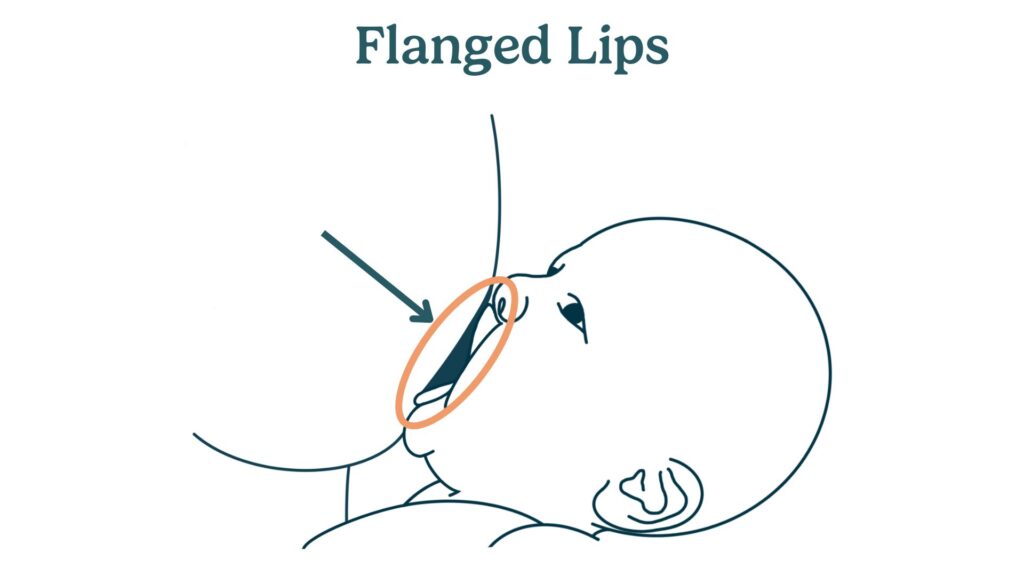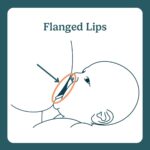flanged lips

Flanged lips
Flanged lips refer to the outward position of a baby’s lips while they are latched onto the breast during breastfeeding. When a baby’s lips are flanged, they create a good seal around the areola, which is important for effective milk transfer and preventing nipple pain.
What to watch out for
It’s important to recognize the signs of flanged lips and understand how to achieve them. Here are some considerations and tips:
Signs of Flanged Lips
- Outward position: Your baby’s lips should be turned outward, resembling “fish lips,” rather than tucked inward.
- Good seal: The flanged lips help create a good seal around the areola, allowing effective milk transfer.
- Comfortable feeding: Proper lip position can prevent nipple pain and ensure comfortable feeding for both you and your baby.
- Effective feeding: Your baby should be able to suck and swallow milk effectively, indicating a good latch.
Achieving Flanged Lips
- Positioning: Ensure your baby is positioned correctly with their body facing you. Common positions include the cradle hold, cross-cradle hold, football hold, and side-lying position.
- Wide-open mouth: Encourage your baby to open their mouth wide before latching. You can gently tickle their upper lip with your nipple to stimulate a wide gape.
- Chin-first approach: Aim to bring your baby to your breast chin-first, allowing them to take in a large portion of the areola, not just the nipple.
- Support: Support your breast with one hand as you bring baby to it. Once you bring baby close, guide your areola into baby’s mouth. Infants might need more help with this practice in their first days of life.
- Adjust as needed: If your baby’s lips are not flanged, gently adjust their position by pulling down on their chin, adjusting your hold, or gently using your finger to untuck their lips..
Tips for Managing Flanged Lips
- Re-latch: If you feel pain or see signs of a poor latch, gently break the suction by inserting a clean finger into the corner of your baby’s mouth and try latching again.
- Stay relaxed: Ensure you and your baby are both comfortable and relaxed during breastfeeding. Stress and tension can affect latching.
- Seek help: If you continue to have trouble achieving flanged lips, consult a lactation consultant for personalized support and guidance.
Physical limitations or health circumstances
Certain conditions can influence the ability to achieve flanged lips:
- Tongue tie: A condition where the tissue under the tongue is too tight, restricting movement and making it difficult for the baby to achieve a deep latch.
- Lip tie: A condition where the tissue connecting the upper lip to the gum is too tight, affecting the latch.
- Premature birth: Premature babies may have weaker sucking reflexes and may need extra support to achieve a good latch.
Other terms
Understanding related terms can help you better manage flanged lips and related breastfeeding practices:
- Latch: The way your baby attaches to your breast. A good latch is important for effective breastfeeding. Learn more about latch.
- Areola: The darker area surrounding the nipple. A deep latch includes a good portion of the areola in the baby’s mouth.
- Nipple shield: A tool that can help protect sore nipples and improve latch in some cases. Nipple shields should be used under the guidance of an IBCLC. Learn more about nipple shields.
- Engorgement: Swelling and discomfort of the breasts due to milk accumulation, which can make latching more difficult. Learn more about engorgement.
- Lactation consultant: A professional who can provide support and guidance on breastfeeding issues, including achieving a proper latch with flanged lips.


